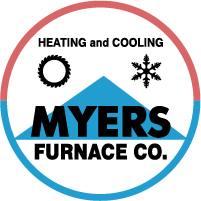Purchasing your first home is an exhilarating experience. You’re likely trying to keep track of numerous details to ensure you’re making the right choice. We believe that understanding your future HVAC system is essential. The property’s HVAC system represents a significant investment and source of potential long-term costs, so being thorough helps all first-time homebuyers.
In this guide, we’ll share seven tips for learning everything you can about a home’s heating and cooling setup. And if you want a deeper opinion from the pros, feel free to call Myers Furnace Company. Our seasoned technicians can help you compare your options with industry insights you won’t find elsewhere.
1. What HVAC System Are You Working With?
Start by determining what specific HVAC system the home features. Furnaces generally last longer than air conditioners, and newer types of HVAC systems like heat pumps boast average life spans longer than ever. Tracking down the make and specific model provides a clear idea of how much routine maintenance it might need.
2. How Old Is the Current HVAC System?
It also helps to learn how old the HVAC system is when you’re considering a new home. On average, HVAC systems should survive for around 10-12 years. Learning its approximate installation date helps you plan for possible repair needs or considerations if it might break down. Older systems may be more vulnerable to problems, so planning ahead of time for a replacement unit could be necessary sooner than you thought.
3. Is the Warranty Active?
Don’t forget to look into whether the HVAC system is still under warranty. If it is, this can lighten the load for maintenance costs. HVAC warranties often cover parts and labor, but the details in each policy will vary. Make sure you go over any terms that seem confusing to ensure you understand your coverage and any possible out-of-pocket costs.
4. Does the System Have a Documented Maintenance History?
Next, examine the maintenance history of the HVAC system, if such information is accessible. This kind of information can demonstrate if the repair needs are high or how often maintenance is performed. You should at least try to track down a history of key tasks like filter changes, which can indicate it received regularly scheduled tune-ups.
5. Do You Know Its Energy Efficiency Ratings?
Selecting a system with high energy efficiency isn’t just smart; it leads to more manageable utility bills and a smaller environmental impact. Look for the seasonal energy efficiency ratio (SEER) ratings for air conditioning and the annual fuel utilization efficiency (AFUE) for furnaces. High SEER ratings mean more efficient cooling throughout the season, while high AFUE ratings illustrate that the fuel is more effectively burned for useable heat.
6. Can You Spot Trouble After Your Own Inspection?
Even without experience in HVAC systems, you can still take a moment to inspect the HVAC system yourself. Keep an eye out for potential issues that haven’t been mentioned by the seller. This can mean bizarre noises, stubborn patches of the house that are too hot or cold and attempts at concealing any visible damage.
7. Have You Sought Out Expert Advice?
If you’re still hesitant to make an offer because of the current state of the HVAC system, it’s beneficial to get an assessment and recommendation from certified HVAC technicians. They are skilled at identifying things you might miss, such as leaking coolant, damage to the wiring or inefficient ductwork.
A Chat with Myers Furnace Company Helps Take the Stress Out of Your Home-Buying Journey
Finding your first home is meant to be a joyful event, and Myers Furnace Company will do everything possible to ensure that doesn’t change. Connect with us at 816-370-5244. We can discuss how our HVAC services give you peace of mind, giving you what you need to make an offer with confidence.
